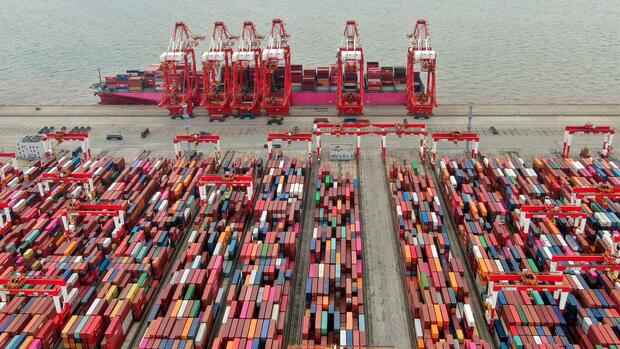Berlin / Beijing For some it is a success story, for others a curse. China’s accession to the World Trade Organization 20 years ago still causes controversial assessments, but in the West most politicians and economists say that hopes for the “change through trade” predicted at the time have not been fulfilled in China. For them, China has gone from being a beacon of hope to the bad boy of the global economy.
“For too long, China’s failure to comply with global trade standards has undermined the prosperity of Americans and other people around the world,” recently criticized US Trade Representative Katherine Tai. That is why US President Joe Biden has upheld the $ 300 billion punitive tariffs on Chinese exports that his predecessor Donald Trump had once imposed.
The American economist David Autor from the Massachusetts Institute of Technology (MIT) has examined how China’s accession affected the US economy. He speaks of a “China shock” that has continued into the present. According to this, traditional industrial sectors in the USA in particular lost around 2.5 million jobs after China joined the country.
Top jobs of the day
Find the best jobs now and
be notified by email.
There is also disillusionment among many companies in Western countries that are involved in China. In the seven to eight years after China joined the WTO, the country began to open up, says EU Chamber of Commerce President Jörg Wuttke. “The European Chamber of Commerce was founded because we thought the journey would go on like this.” But after 2007/2008, European companies noticed that the desire for reform was waning. “I don’t expect a major opening in the next ten years,” says Wuttke today. “China will remain important to us, but the importance will not be as great as it has been in recent years.”
The US trade commissioner criticizes China’s trade practices.
(Photo: dpa)
The list of complaints from Western companies about Beijing is long. It ranges from massive subsidies from Chinese companies to distortions of competition by state-owned companies and theft of intellectual property.
One of the most glaring problems is the forced technology transfer, writes the Mercator Institute for China Studies (Merics) in a new study. This practice has cost foreign companies billions and has put Chinese competitors ahead in some industries. “We are solving two problems, and three new ones are being added,” confirms EU Chamber President Wuttke.
From Beijing’s point of view, things are different: China’s economy has increased roughly tenfold since 2001 and has become the second largest economy in the world.
However, even in the People’s Republic, the increase in prosperity is not distributed equally everywhere and varies from region to region. Nonetheless, analysts at the investment bank Nomura believe that China could overtake the US as the largest economy as early as 2028.
“China has fully met the commitments it made when it joined the World Trade Organization in 2001,” the state news agency Xinhua quoted as quoting party leader Xi Jinping.
Since joining the WTO, the Chinese central government has abolished more than 2,300 laws and regulations, and local governments more than 190,000. This step has given the Chinese market and society new momentum, said Xi.
The WTO increasingly has to deal with trade disputes.
(Photo: Reuters)
How does this fit in with the complaints of the West? It is not always obvious violations that Beijing tries to use for advantages in world markets. China often only uses the loopholes in the WTO rule book.
This applies above all to the regulation of state aid, the definition and permissibility of which has been disputed for years at the WTO headquarters in Geneva. Nevertheless, there are clear breaches of the rules: China does not inform the World Trade Organization about its state aid, although WTO members are obliged to do so, criticizes Audrey Winter, the former US Vice Trade Representative for China.
The fact that the US has turned from the reform engine of world trade to a troublemaker under Trump and that Biden continues to block the work of the WTO makes an early end to the subsidy race unlikely.
But it is not only China’s violations of the rules of the game of world trade that are causing displeasure around the world. Beijing is also increasingly using its growing economic power as a political weapon against critics.
The case of Lithuania is the most recent example: Beijing recently paralyzed all trade with the Baltic Republic after Taiwan was allowed to open an agency in Vilnius. Before that, Japan, South Korea and Australia had already felt Beijing’s discontent economically.
“The impacts are getting closer,” says Merics director Mikko Huotari. Lithuania is the first test case for the EU. The new federal government must now address the process in Brussels. “It would be important that the planned EU rules against blackmail attempts by third countries are not watered down now,” demands Huotari.
More: EU deputy on the European threat of counter-sanctions: “We expect a deterrent effect”
